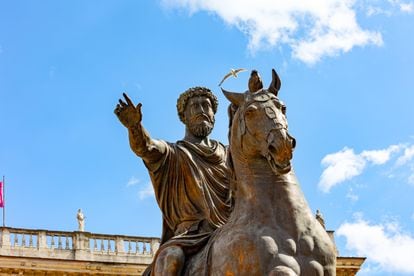If a Roman emperor has gone down in posterity with the image of a
wise and considered man,
capable of making the right and just decisions, as a thoughtful politician, drawn despite himself to numerous wars that he always undertook for the good of the Empire, that is Marcus Aurelius (121-180).
His book,
The Meditations,
an imperishable Stoic manual, continues to be sold and distributed.
The Spanish translation is available in eight different editions, not counting a manga version.
But posterity is always a mystery because under his reign some of the most brutal and best-documented persecutions of Christians took place: the famous martyrs of Lyon, devoured by wild beasts in 177, to the delight of the people who never tired of asking for blood.
From The
Decline and Fall of the Roman Empire
(Atalanta), Edward Gibbon's great 18th century classic, to
The Fall of the Roman Empire
(1964), where he is played by Alec Guinness, or
Gladiator
(2000)
,
the film in which the philosopher emperor was played by Richard Harris, the emperor of the Antonine dynasty had only had one stain on his record: that his successor was his son Commodus, one of the worst emperors in history, who competes in cruelty and madness with Caligula or Nero.
In fact, in Ridley Scott's film, the script exempts him even from this defect, because the emperor wants his successor to be his best general, Máximo Décimo Meridio, played by Russell Crowe.
More information
The Almost Perfect Emperor
Alec Guinness as Marcus Aurelius in 'The Fall of the Roman Empire'.
When Commodus realizes that he is going to be pushed aside, he first strangles his father and then tries to kill Máximo, who survives only to become a slave and avenge the murder of his family by delivering one of the greatest speeches ever heard. in an amphitheater: “My name is Máximo Décimo Meridio, commander of the armies of the North, general of the Phoenix Legions, faithful servant of the true emperor Marcus Aurelius.
Father of a murdered son, husband of a murdered wife, and I swear I will take my revenge, in this life or the next."
Gibbon goes even further and marks Marcus Aurelius's reign as the happiest in human history, an honor he shares with five other emperors: Nerva, Trajan, Hadrian, Antoninus Pius, and Lucius Verus.
“If a man were asked to point out the period of world history in which the condition of the human race was happier and more prosperous”, writes the English historian in the translation by José Sánchez de León Menduiña for Atalanta, “without hesitating would say the one that passed from the death of Domitian to the accession to the throne of Commodus.
The vast expanse of the Roman Empire was ruled by absolute power under the guidance of virtue and wisdom.
The armies were contained by the firm but moderate hand of successive emperors, whose characters and authority commanded respect.
"The life of Marcus Aurelius himself (121-180) covered almost three quarters of that time, while his reign (161-180) occupied its last 19 years," writes Anthony Birley in his biography of the ruler (published in Spanish by Gredos in translation by José Luis Gil Aristu), whose summary says it all: 'The portrait of a human and just emperor'.
“Casius Dion, born shortly after Marcus came to power, wrote in recounting his death: 'My story descends from a kingdom of gold to one of iron and rust, and that is also how things went for the kings. Romans at that time.
Interestingly, Birley stresses, none of these emperors was the son of his predecessor, "hence some contemporary observers and many later commentators, including Gibbon,
they thought that the imperial succession was governed then by a new principle: 'the election of the best'.
In reality, no principle or deliberate measure was involved.”
Equestrian statue of Marcus Aurelius, on the Capitoline Hill in Rome.getty
As wise as he was, Marcus Aurelius lived in a violent world and his life and reign were marked by the northern wars, during which he had to defend the borders of the Empire from the attacks of the barbarians - a conflict that with such force and detail reconstructs Ridley Scott in the opening scenes of
Gladiator
—.
And it was also a time when Christians could be torn to pieces by wild beasts: after a period of calm after the persecutions of Nero, those who professed this faith were again martyred, although not in an organized way, but depending on each individual. governor and citizen complaints.
Birley in his biography recounts that intellectuals as relevant as Tacitus, Pliny and Suetonius —who we continue reading and admiring centuries after his disappearance— considered that “Christians were pernicious people who deserved to die”.
However, Mar Marcos, professor of Ancient History at the University of Cantabria, believes that he was not a particularly fierce emperor with those who practiced this new cult.
"There is no evidence that Marcus Aurelius had changed his predecessors' policy toward Christians, which had consisted of punctual punishments in response to complaints," says this expert on ancient Christianity.
“In no case can one speak of 'persecution'.
There are no legislative documents of this emperor on Christians.
What we know of his attitude toward them comes from the generally unreliable Christian apologetic literature and martyrdom accounts.
In the
Meditations,
Marcus Aurelius admires, negatively, the predisposition of Christians to martyrdom.
However, during his rule the martyrs of Lyon, which was then called Lugdunum, were executed.
"The story of the martyrs of Lyon is the longest preserved of the several that allude to martyrdoms in the time of Marcus Aurelius," continues Professor Marcos.
“The document has a very special format, a letter from the Christians of Gaul to those of Asia Minor, detailing the facts, in particular the torture applied to them.
The names of the martyrs are given and among them stands out a woman, Blandina, who showed great fortitude.
Roman citizens were beheaded;
non-citizens were thrown to the wild beasts in the amphitheater before a large audience.
The document circulated in ancient times and had a great impact on the Christian community.
The martyrdom of Santa Blandina, according to Émile Bayard.Getty
Researcher Douglas Boin, author of
Coming out.
Christian in the roman world.
How followers of jesus made a place in caesar's empire
(Bloomsbury) —”Going out into the light.
Christians in the Roman world.
How the followers of Jesus carved out a niche for themselves in Caesar's empire”—pronounces in a similar vein: “Punishments were most likely no more lethal or cruel under Marcus Aurelius than at any earlier time in Roman history, for other criminals.
“Rome's treatment of criminals, including slaves and non-citizens, was always brutal and savage, with a standard menu of sadistic punishments—lashes, torches, crosses, and the like—used to deter insurrections, riots, slaves and other outbreaks of rebellion.
Christians arrested in Lyon would have been subjected to some or all of these tortures, especially if they did not have the rights of a Roman citizen, and sources indicate that many did not.
Being thrown to the wild was always, for condemned criminals in Rome, a very real possibility," continues Boin, who concludes: "So it's true: an emperor who became famous for his reflections on how to be a fair-minded ruler oversaw a empire of citizens who enjoyed blood in the amphitheaters”.
This researcher from the University of Saint Louis (United States) considers that what is known about this episode comes mainly from Christian writers, who used it as propaganda with stories of martyrs who did not hesitate to face the beasts without renouncing their faith or , as in the case of Blandina, they managed to defeat them —although she was later torn to pieces by a brave bull—.
They were stories that helped cement a religion that was being formed.
“What happened in Lyon was a great spectacle for the Romans and a martyrdom for the Christians, but as history, the heroes and villains of the time are much less clear.
Even the role of the supposedly 'enlightened' emperor is difficult to elucidate”.
Lyon amphitheater.
Alamy / cordon press
You can follow BABELIA on
and
, or sign up here to receive
our weekly newsletter
.
50% off
Subscribe to continue reading
read without limits
Keep reading
I'm already a subscriber


/cloudfront-eu-central-1.images.arcpublishing.com/prisa/MDH3KIAHJJA3FODJ6NEQPVUA6A.jpg)



/cloudfront-eu-central-1.images.arcpublishing.com/prisa/UNETYPZTLZGJZGXEZA2R4WGRVY.jpg)








